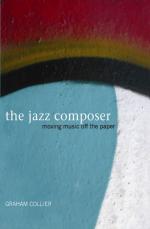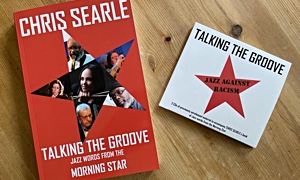Home » Jazz Articles » Book Review » The Jazz Composer: Moving Music Off The Paper
The Jazz Composer: Moving Music Off The Paper
 The Jazz Composer: Moving Music Off The Paper Graham Collier
The Jazz Composer: Moving Music Off The Paper Graham Collier Hardcover; 314 pages
ISBN: 978 09557888 0 2
Northway Books
2009
Bassist, composer and bandleader Graham Collier's preoccupation with form is itself, in a very literal sense, a central concern of this book: with the passage of time, Collier's music has grown ever more structurally sophisticated. Such is its depth in 2009 that it is hardly surprising that The Jazz Composer: Moving Music Off The Paper should resemble a polemic in support of that trajectory, even while it discusses how to take jazz beyond notated scores.
Happily for the reader, Collier is richly opinionated too, and his opinions are expressed in scholarly fashion. Thus his dismissal of trumpeter Wynton Marsalis and his fellow conservatives is pertinent for all the right reasons. So too is his lengthy examination of pianist, composer and bandleader Duke Ellington; in the course of this, Collier risks the wrath of those for whom Ellington could do no wrong, even while he's eloquent on the the man's ultimate genius.
Such nuances of opinion muddy the waters, but the debate about jazz form is, inescapably, of great complexity. About that Collier is eloquent without being verbose, even though many new millennial jazz composers strain his patience. At the heart of his argument is an appeal for creativity—a quality, Collier believes, of which there is a distinct lack in 2009.
The book is not, however, merely a display of personal opinions. In his preoccupation with "moving music off the paper," Collier is acutely aware of the implications of such an idea. He's of the same mind when it comes to the musicians charged with that job and how they add a dimension to the notes on paper. In discussing this, he makes a persuasive case for jazz as unique unto itself, even while it has always, and continues to, "borrow" from other musical forms with which it might appear to have little or nothing in common.
Creativity is integral to this argument, as it has been since Lester Young made his radical break with Coleman Hawkins and took jazz tenor saxophone playing on a new path. This is something about which Marsalis and his cohorts appear to be in denial. And while Collier doesn't make that point explicitly, he does ally himself with the notion of individuality.
It's that very individuality which has always been a mark of Collier's composing, and as a consequence this book is integral to his overall musical conception. Indeed, the continuity between Collier the composer of music and Collier the composer of text is pronounced. In both cases his lack of arrogance, in marked contrast to the Marsalis precedent, endears him to the reader, even in the face of his own trenchantly expressed opinions.
< Previous
Finding Nymo
Next >
St. Peter Street Strutters
Comments
About Graham Collier
Instrument: Composer / conductor
Related Articles | Albums | Photos | Similar ToTags
For the Love of Jazz
 All About Jazz has been a pillar of jazz since 1995, championing it as an art form and, more importantly, supporting the musicians who create it. Our enduring commitment has made "AAJ" one of the most culturally important websites of its kind, read by hundreds of thousands of fans, musicians and industry figures every month.
All About Jazz has been a pillar of jazz since 1995, championing it as an art form and, more importantly, supporting the musicians who create it. Our enduring commitment has made "AAJ" one of the most culturally important websites of its kind, read by hundreds of thousands of fans, musicians and industry figures every month.























